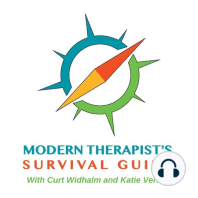26 min listen

What Therapists Need to Know about Abortion and Termination for Medical Reasons: An Interview with Jane Armstrong
FromThe Modern Therapist's Survival Guide with Curt Widhalm and Katie Vernoy
What Therapists Need to Know about Abortion and Termination for Medical Reasons: An Interview with Jane Armstrong
FromThe Modern Therapist's Survival Guide with Curt Widhalm and Katie Vernoy
ratings:
Length:
42 minutes
Released:
Aug 1, 2022
Format:
Podcast episode
Description
What Therapists Need to Know about Abortion and Termination for Medical Reasons: An Interview with Jane Armstrong Curt and Katie interview Jane Armstrong, LCSW, a clinical social worker in Texas, about terminating a wanted pregnancy for medical reasons. We look at the impacts of the overturn of Roe v Wade on reproductive care. We also dig into what termination for medical reasons (TFMR) is, how society stigmatizes these parents, and what therapists can do to effectively support clients facing this decision and the outcome of TFMR. Transcripts for this episode will be available at mtsgpodcast.com! An Interview with Jane Armstrong, LCSW-S, PMH-C Jane is a termination for medical reasons (TFMR) mom, native Texan, & clinical social worker certified in perinatal mental health. Following the birth & death of her first child, Frankie, through TFMR, Jane opened Both/And Therapy, PLLC to provide individual therapy & support groups to other TFMR parents. These services aim to support clients through the unique barriers & grief of ending a wanted pregnancy, particularly in the state of Texas where such care is no longer accessible. She’s passionate about building community, eliminating shame, & honoring grief for TFMR families. In this podcast episode, we talk about Termination for Medical Reasons (TFMR) In the wake of Roe v. Wade being overturned, we reached out to Jane Armstrong, LCSW-S, PMH-C who specializes in TFMR and is based out of Texas, a state with some of the biggest barriers to this type of medical, reproductive care. What are the clinical impacts on individuals who are considering or who have had an abortion? Trauma related to pregnancy as well as abortion The differences between ending wanted and unwanted pregnancies The shame – societal and internalized What therapists can get wrong when interacting with the topic of abortion Unexamined bias related to abortion TFMR – is baby loss and TFMR parents are entitled to grief Disenfranchised grief and traumatic loss The impact of anti-abortion legislation on patients considering abortion and TFMR Lack of access to all types of medical care Logistics related to getting access to medical care The emotional impact of continuing to carry a pregnancy when it is known that the baby will die How late parents can find out about medical concerns that mean that TFMR is indicated The lack of time to make a decision What is Termination For Medical Reasons (TFMR)? “These are things [a health issue with the pregnant person or with the baby leading to TFMR] that may be fatal, it may not be. A lot of them you may not know, but you do know that there is the potential for tremendous suffering.” – Jane Armstrong, LCSW Terminating a pregnancy due to health issues with the pregnant person or with the baby For the pregnant person: fatal Hyperemesis Gravidarum, requirement for treatment, mental health conditions For the baby: 12 week genetic screenings or subsequent testing, scans, etc. can point out chromosomal abnormalities, neural tube deficits “In my own experience, we did do an amniocentesis, but we knew that we likely wouldn't get the results until after my pregnancy had ended, because it would be typically about two weeks, which would have pushed us over the limit in our state. So, there is a very loudly ticking clock over most of these parents on what should be – and is – the most important decision they've ever made. And it leaves very little room for compassion for the time these parents need to research and get second opinions and really understand what this diagnosis means.” – Jane Armstrong, LCSW How can therapists work with TFMR clients? The conflict between the laws and a clinician’s own ethics Make sure your clients know you will be a support resource to them The importance of the client being able to tell their story Recognizing that TFMR is typically not talked about and opening space for these clients Trauma, grief, loss – sitting with the client with their hard stuff
Released:
Aug 1, 2022
Format:
Podcast episode
Titles in the series (100)
It’s Time to Think About Your Goals: Curt and Katie talk about SMART goals, habits, and life-style changes by The Modern Therapist's Survival Guide with Curt Widhalm and Katie Vernoy